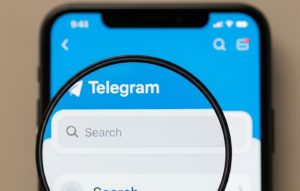In an age of constant digital surveillance, the search for a truly private communication channel is more critical than ever. Telegram is often praised for its security, but when it comes to voice conversations, a crucial question arises: can Telegram calls be traced? You might be using Telegram for its promise of privacy, but a hidden default setting could be revealing more than you think.
Let’s get straight to the answer. The content of your Telegram calls is protected by end-to-end encryption, making it nearly impossible for anyone—including Telegram or law enforcement—to listen in. However, there is one major exception that can expose your location: your IP address. This guide will explain exactly what that means and show you how to fix it.
In a world of constant digital surveillance, Telegram is often seen as a secure fortress for private communication. But how impenetrable is that fortress, really? The critical question on many users’ minds is, can Telegram messages be traced by police? The answer isn’t a simple yes or no, and it hinges on a crucial distinction you might not be aware of. The difference between a “Cloud Chat” and a “Secret Chat”—and even your own device’s security—could be the deciding factor between complete anonymity and potential exposure. This guide breaks down the real risks and protections.
can telegram calls be traced?
To fully answer the question, we need to look at two different things: the content of your call and the metadata of your call.
- Call Content (What you say): This is protected by world-class **end-to-end encryption**. This means only you and the person you are talking to can hear the conversation. The audio is scrambled on your device and unscrambled on theirs. No one in the middle can intercept and listen to it.
- Call Metadata (Who you called and when): This is information about the call, not the call itself. It’s possible that some metadata is logged.
- Your IP Address (Your digital location): **This is the main risk.** By default, Telegram attempts to establish a peer-to-peer (P2P) connection for calls to improve audio quality. In a P2P call, your device connects directly to the other person’s device, which can expose your IP address to them. An IP address can be used to determine your approximate geographical location and internet service provider.

The IP Address Leak: The Single Biggest Risk in Telegram Calls
The default P2P setting is the weakest link in Telegram’s call privacy. While it improves call quality, it sacrifices a layer of anonymity. Fortunately, Telegram provides a simple way to fix this and ensure your calls are always routed through their servers, hiding your IP address from the other party.
Here’s how to maximize your privacy:
- Go to Telegram Settings.
- Select Privacy and Security.
- Tap on Calls.
- Under the “Peer-to-Peer” section, set it to “Never” or “My Contacts”.
By changing this setting, all your calls will be relayed through Telegram’s servers, ensuring your IP address is never revealed to the person you are calling. Making your channels secure is just as important as growing them with the best smm panel.

End-to-End Encryption: Your Unbreakable Shield
The core of Telegram’s call security is its end-to-end encryption, the same technology used in its famous “Secret Chats.” To prove that your call is 100% secure, Telegram provides a simple verification method.
- During any call, you and the other person will see **four emoji** on your screen.
- If your four emoji match the other person’s four emoji, your call is confirmed to be fully encrypted and secure.
This is a simple yet powerful way to verify that there is no “man-in-the-middle” attack on your call. For a deep dive into how this technology works, resources like the WIRED Guide to End-to-End Encryption offer a great explanation.
Cloud Chats vs. Secret Chats vs. Calls
It’s important to understand the different levels of security across Telegram’s features.
| Feature | Encryption Type | IP Address Risk (Default) |
|---|---|---|
| Cloud Chats (Regular Messages) | Client-Server Encryption | Low (Hidden by Telegram servers) |
| Secret Chats | End-to-End Encryption | Low (Hidden by Telegram servers) |
| Voice & Video Calls | End-to-End Encryption | High (Can be exposed via P2P) |
So, Can Law Enforcement Intercept Your Calls?
Directly intercepting and listening to the content of an end-to-end encrypted Telegram call is considered practically impossible with current technology. However, law enforcement agencies have other methods:
- Requesting Metadata: They can legally request call logs (metadata) from Telegram, though Telegram’s official privacy policy states they have disclosed zero bytes of user data to third parties to date.
- Device Compromise: Their most effective method is to gain access to one of the devices involved in the call, either physically or through malware. If a device is compromised, the encryption becomes irrelevant.
So, while the call itself is secure during transit, your overall security depends on your device’s health and your privacy settings. When building a community, using a trusted smm panel for telegram is just as important as securing your communications.
Frequently Asked Questions (FAQ)
1. Does Telegram record or store my calls on their servers?
No. Because calls are end-to-end encrypted, Telegram does not have access to the content of your calls and therefore cannot record or store them. If you disable P2P, your call is routed through their servers, but they cannot decrypt it.
2. Are Telegram video calls as secure as voice calls?
Yes. Telegram’s video calls use the same end-to-end encryption protocol as voice calls, making them equally secure. The same risk of IP address exposure through the default P2P setting also applies.
3. If I disable P2P, will my call quality get worse?
It might, slightly. Using Telegram’s servers adds an extra step for the data to travel, which can sometimes result in a small amount of additional lag or a slight decrease in audio quality compared to a direct P2P connection. However, for most users, the privacy benefit far outweighs this minor potential drawback.







